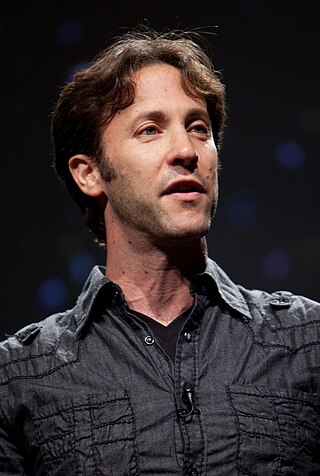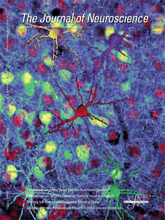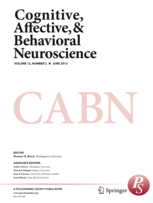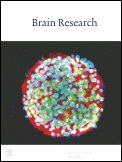
Neuroscience is the scientific study of the nervous system, its functions and disorders. It is a multidisciplinary science that combines physiology, anatomy, molecular biology, developmental biology, cytology, psychology, physics, computer science, chemistry, medicine, statistics, and mathematical modeling to understand the fundamental and emergent properties of neurons, glia and neural circuits. The understanding of the biological basis of learning, memory, behavior, perception, and consciousness has been described by Eric Kandel as the "epic challenge" of the biological sciences.

Cognitive neuroscience is the scientific field that is concerned with the study of the biological processes and aspects that underlie cognition, with a specific focus on the neural connections in the brain which are involved in mental processes. It addresses the questions of how cognitive activities are affected or controlled by neural circuits in the brain. Cognitive neuroscience is a branch of both neuroscience and psychology, overlapping with disciplines such as behavioral neuroscience, cognitive psychology, physiological psychology and affective neuroscience. Cognitive neuroscience relies upon theories in cognitive science coupled with evidence from neurobiology, and computational modeling.

A neuroscientist is a scientist who has specialised knowledge in neuroscience, a branch of biology that deals with the physiology, biochemistry, psychology, anatomy and molecular biology of neurons, neural circuits, and glial cells and especially their behavioral, biological, and psychological aspect in health and disease.
In philosophy and neuroscience, neuroethics is the study of both the ethics of neuroscience and the neuroscience of ethics. The ethics of neuroscience comprises the bulk of work in neuroethics. It concerns the ethical, legal and social impact of neuroscience, including the ways in which neurotechnology can be used to predict or alter human behavior and "the implications of our mechanistic understanding of brain function for society... integrating neuroscientific knowledge with ethical and social thought".

Sir Simon Philip Baron-Cohen is a British clinical psychologist and professor of developmental psychopathology at the University of Cambridge. He is the director of the university's Autism Research Centre and a Fellow of Trinity College. In 1985, Baron-Cohen formulated the mindblindness theory of autism, the evidence for which he collated and published in 1995. In 1997, he formulated the foetal sex steroid theory of autism, the key test of which was published in 2015.

Evolutionary neuroscience is the scientific study of the evolution of nervous systems. Evolutionary neuroscientists investigate the evolution and natural history of nervous system structure, functions and emergent properties. The field draws on concepts and findings from both neuroscience and evolutionary biology. Historically, most empirical work has been in the area of comparative neuroanatomy, and modern studies often make use of phylogenetic comparative methods. Selective breeding and experimental evolution approaches are also being used more frequently.
Neurophilosophy or philosophy of neuroscience is the interdisciplinary study of neuroscience and philosophy that explores the relevance of neuroscientific studies to the arguments traditionally categorized as philosophy of mind. The philosophy of neuroscience attempts to clarify neuroscientific methods and results using the conceptual rigor and methods of philosophy of science.

The International School for Advanced Studies is an international, state-supported, post-graduate-education and research institute in Trieste, Italy.
Neuroinformatics is the field that combines informatics and neuroscience. Neuroinformatics is related with neuroscience data and information processing by artificial neural networks. There are three main directions where neuroinformatics has to be applied:

David Eagleman is an American neuroscientist, author, and science communicator. He teaches neuroscience at Stanford University and is CEO and co-founder of Neosensory, a company that develops devices for sensory substitution. He also directs the non-profit Center for Science and Law, which seeks to align the legal system with modern neuroscience and is Chief Science Officer and co-founder of BrainCheck, a digital cognitive health platform used in medical practices and health systems. He is known for his work on brain plasticity, time perception, synesthesia, and neurolaw.

Risto Kalervo Näätänen is a psychological scientist, pioneer in the field of cognitive neuroscience, and known worldwide as one of the discoverers of the electrophysiological mismatch negativity. He has been a much-cited social scientist and one of the few individuals appointed permanent Academy Professor of the Academy of Finland. He retired in 2007, retaining a title of Academy Professor emeritus of the Academy of Finland. Since 2007, he has been a professor at the University of Tartu.

The Journal of Neuroscience is a weekly peer-reviewed scientific journal published by the Society for Neuroscience. It covers empirical research on all aspects of neuroscience. Its editor-in-chief is Marina Picciotto. According to the Journal Citation Reports, the journal has a 2020 impact factor of 6.167.
Genes, Brain and Behavior is a peer-reviewed online-only scientific journal covering research in the fields of behavioral, neural, and psychiatric genetics. It is published by Wiley-Blackwell on behalf of the International Behavioural and Neural Genetics Society. The journal was established in 2002 as a quarterly and is currently published monthly. G2B is a hybrid open access journal, but two years after publication all content is available for free online.
UCL Neuroscience is a research domain that encompasses the breadth of neuroscience research activity across University College London's (UCL) School of Life and Medical Sciences. The domain was established in January 2008, to coordinate neuroscience activity across the many UCL departments and institutes in which neuroscience research takes place. In 2014, the Nobel Prize in Physiology or Medicine was awarded to the UCL neuroscientist John O'Keefe. In two consecutive years 2017 and 2018, the Brain Prize, the world's most valuable prize for brain research at €1m, was awarded to UCL neuroscientists Peter Dayan, Ray Dolan, John Hardy, and Bart De Strooper.

Olaf Sporns is Provost Professor in Psychological and Brain Sciences at Indiana University and scientific co-director of the university's Network Science Institute. He is the founding editor of the academic journal Network Neuroscience, published by MIT Press.
Educational neuroscience is an emerging scientific field that brings together researchers in cognitive neuroscience, developmental cognitive neuroscience, educational psychology, educational technology, education theory and other related disciplines to explore the interactions between biological processes and education. Researchers in educational neuroscience investigate the neural mechanisms of reading, numerical cognition, attention and their attendant difficulties including dyslexia, dyscalculia and ADHD as they relate to education. Researchers in this area may link basic findings in cognitive neuroscience with educational technology to help in curriculum implementation for mathematics education and reading education. The aim of educational neuroscience is to generate basic and applied research that will provide a new transdisciplinary account of learning and teaching, which is capable of informing education. A major goal of educational neuroscience is to bridge the gap between the two fields through a direct dialogue between researchers and educators, avoiding the "middlemen of the brain-based learning industry". These middlemen have a vested commercial interest in the selling of "neuromyths" and their supposed remedies.

The Neuroscientist is a peer-reviewed academic journal that publishes papers in the field of Neurology and Neuroscience. The journal's editor is Stephen G Waxman. It has been in publication since 1995 and is currently published by SAGE Publications.

Cognitive, Affective, & Behavioral Neuroscience is peer-reviewed scientific journal covering research on behavior and brain processes in humans. It was established in 1973 as Psychobiology and received its current title in 2001, with volume numbering restarting at 1. The journal is published by Springer Science+Business Media on behalf of the Psychonomic Society and the editor-in-chief is Diego A. Pizzagalli.
Cognitive biology is an emerging science that regards natural cognition as a biological function. It is based on the theoretical assumption that every organism—whether a single cell or multicellular—is continually engaged in systematic acts of cognition coupled with intentional behaviors, i.e., a sensory-motor coupling. That is to say, if an organism can sense stimuli in its environment and respond accordingly, it is cognitive. Any explanation of how natural cognition may manifest in an organism is constrained by the biological conditions in which its genes survive from one generation to the next. And since by Darwinian theory the species of every organism is evolving from a common root, three further elements of cognitive biology are required: (i) the study of cognition in one species of organism is useful, through contrast and comparison, to the study of another species’ cognitive abilities; (ii) it is useful to proceed from organisms with simpler to those with more complex cognitive systems, and (iii) the greater the number and variety of species studied in this regard, the more we understand the nature of cognition.

The Department of Brain and Cognitive Sciences at the Massachusetts Institute of Technology, Cambridge, Massachusetts, United States, engages in fundamental research in the areas of brain and neural systems, and cognitive processes. The department is within the School of Science at the MIT and began initially as the Department of Psychology founded by the psychologist Hans-Lukas Teuber in 1964. In 1986 the MIT Department of Psychology merged with the Whittaker College integrating Psychology and Neuroscience research to form the Department of Brain and Cognitive Sciences.













